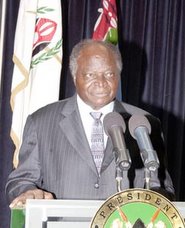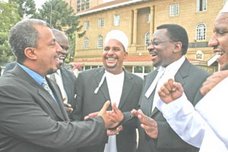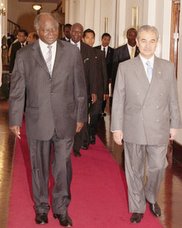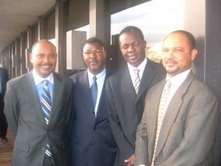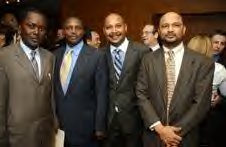Although the resignation of Amos Kimunya from the Finance ministry was not a voluntary one, but to resign Kimunya did. The vote of no-confidence passed by the National Assembly against the then Finance minister might not have done the trick to have forced him out of office per se, but that vote was crucial at least started the fire that was perhaps difficult to put out. My take is that the Kipiriri MP was forced to quit from that pivot cabinet docket as he wasn’t about to give the fight to retain his position. Kenyans will always remember the, ‘he would rather die than resign’ statement Kimunya gave at the comfort of his Kipiriri backyard.
Now with Kimunya gone, the train wreck should not stop there. Other heads must roll. All individuals associated with the Grand Regency Hotel scandal should resign, voluntary or otherwise. The Central Bank of Kenya governor Prof. Njuguna Ndung’u should be the next person to be shown the door as it appears he still clinging to his position. Before he gave evidence to the parliamentary committee investigating the hotel saga, the other individual that would have been compelled to quit, or step aside, would have been the National Security Intelligence Services Director General Brig-Gen Michael Gichangi.
Unlike Kimunya, who had no respect for the parliament of which he was a member, the spy chief respects the country’s laws and the supremacy of the legislative branch, went before the Parliamentary Committee on Finance, Planning, Trade and Tourism, where he was grilled and voluntarily gave evidence that pertains to the sale of the Nairobi’s prestigious hotel. He could have refused citing security privileged or something to the effect. But he didn’t.
It is interesting to note that Gichangi told the committee that his office wrote to all relevant offices, arguing the holders of those offices against the sale, which he noted contravened the Public Procurement and Disposal Act and the Privitisation Act. Imagine, a spy chief remind ‘relevant offices’ of the contravening of an important law in the disposal of a public property.
With his tangible evidence in tow, the NSIS chief apparently wrote to Prime Minister Raila Odinga, Vice-President Kalonzo Musyoka, the Finance Minister Amos Kimunya and Attorney General Amos Wako. Funny how things turn out, it now emerges that Raila, Musyoka and Wako were all aware of the impeding sale of the hotel and the objection Mr. Gichangi had on the impending deal. My question to the so called ‘relevant persons’, what action did any one of them (individually or jointly) do to assist in stopping the sale?
Thank you Gichangi, and kudos for your candid and condor in this matter and for your leadership. It is sad that this diligent and honest civil servant was being fried in the media and none of these individuals came to his defence. Politicians instead were trying to protect and shield one of their own, Kimunya.
With Gichangi evidence, it now seems unlikely that Kimunya will return to the Finance docket if he were to make a comeback to the cabinet. This is despite the fact that the president did not name a substitutive minister to handle the docket by appointing the Environment and Mineral Resources minister John Michuki on acting capacity.
Boldly speaking Ndung’u must be compelled to resign or President Kibaki should fire him like yesterday. The Attorney General has not denied the allegations that he met with the lawyers representing the controversial buyer of the hotel seven times. If this is true, then Wako also must step aside, until his name is cleared.
+++++++++++++++++++++++
Public confused?
When it comes to the Grand Regency Hotel scandal the public is confused. They have lots of questions. Kenyans need to know how much did the following individuals, Prime Minister Raila Odinga, Vice President Kalonzo Musyoka and Attorney General Amos Wako knew about the Grand Regency Hotel deal.
Did individual or individuals some people miss their cut in this deal as being the reason why Amos Kimunya has so far been the only causality of this scandal? Would Kenyans have known about this scandal (if it is scam) had all those concerned been given their fair cuts of deal? I am not pointing accusing finger to anyone here. I am just asking questions that are in the minds of many Kenyans.
The Prime Minister’s statement he issued in Parliament was not as comprehensive as it should have been. Before he issued the statement the Prime Minister acted as if he didn’t know anything about this sale, hence the quick set up of a committee comprising of his Administrative Secretary, KACC chief Aaron Ringera, AG Amos Wako, Lands Minister James Orengo and Nairobi Development Minister Mutula Kilonzo.
In his ministerial statement Raila, while acknowledging an eight-page undated and unsigned typed document from the CBK governor Njunguna Ndung’u, he never mentioned the official communication he received from Brig-Gen Michael Gichangi. Raila claims he knew about the deal after the deal was already done, but Gichangi says he wrote to Raila amongst others relevant officials before the deal was done.
How about you Mr. Vice President? You are acting as if you are holier than thou. You are pretending, at least in the eyes of the public, as if you are the voice of reason in defending Kimunya, but apparently you knew a lot more about this deal all along than you have admitted in public. In fact the VP has not said anything when it comes to this scandal. Although Musyoka is positioning himself for the run for presidency and do not want to alienate the crucial Central province voters, but in certain times, he needs to show leadership and statesmanship.
Mr. A.G Amos Wako. Another one pretending as if the sale was news to him. According to the grapevine Wako knew about this impeding sale, even if he was not informed officially by Central Bank of Kenya. He must have known about the deal though Gichangi’s letter. And let us not forget, because he has yet to deny, Wako met the lawyers of the infamous Libyan investment company seven times. One wonders, what they were discussing in those seven meetings even if those meetings lasted just one hour each.
I am confused. What is going one in Kenya? And if I am confused, imagine an ordinary Kenyan. After Gichangi’s evidence to the Parliamentary Committee on Finance, Planning, Trade and Tourism, perhaps Kenya need appreciate the comments of the former Finance minister when he told those people who are commenting on this issue that they don’t know what they are talking about. In fact Kimunya went to the extent to saying Kenyans should praise him for the job well done instead of condemning him.
Let us hope that the Justice (rtd) Majid Cockar-led commission appointed by the president will shade light in this matter. All those implicated must be fired or resigned, that includes Raila Odinga for that matter.
Saturday, July 12, 2008
Sunday, July 6, 2008
This culture of corruption like tribalism is a threat to us
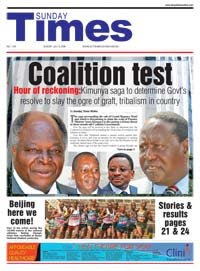
Commentary & Analysis
Updated on: Sunday, July 06, 2008
Story by: BOLD SCRIPTS with OMAR ALI
Just like tribalism, corruption cannot be eradicated in Kenya. Those in the position of power have no moral desire to do so because they themselves want to acquire the wealth through whatever means for their families.
In addition there is no deterrent effect to stop corruption just like there is none to eradicate tribalism. Corruption has already become part of our culture so to speak.
In addition there is no deterrent effect to stop corruption just like there is none to eradicate tribalism. Corruption has already become part of our culture so to speak.
It starts from the top in boardrooms and tickles its way down to the main street. That is why, the lowest individuals on the street such as the Traffic Police Officer or police manning a road-block will always demand “kitu kidogo” because they know it is our culture. Talk of culture of corruption. Take for instance, the two former first families of the Mzee Jomo Kenyatta and Daniel arap Moi who are today two of the wealthiest families in the Eastern Africa region and yet both Kenyatta and Moi are known to have came from humble beginnings. Where did they get such wealth?
A question comes; from whom did the Kenyatta family purchase the huge tracts of lands they own at the Coast and elsewhere in the country? How about the Moi family? Let us leave the first families, perhaps you give them a pass and say they patriarchs were heads of states. There are families of former “powerful” provincial commissioners and district commissioners, from both the Kenyatta and Moi regimes, who are so wealthy one wonders how did they acquired such wealth if it was not through corrupt means.
I remember a story of a court battle involving an estate of a former PC hailing from Rift Valley (who was deceased), the fight involved a staggering Sh100 million.
How could a PC’s estate be worth Sh100 million? From the PCs and DCs, we have former ministers, assistant ministers and other senior government bureaucrats who are today millionaires and billionaires all through questionable means – read corruption. I don’t want to name names, some of them have since legitimizes their wealth and are now referred and o considered successfully businessmen and women.
We have Pattni who came from nowhere and become a billionaire through the help of cabinet ministers and senior government officials, who also benefited and acquired the wealth together. In the Goldenberg scandal Kenyans did not see anyone going to prison and or payback the public funds that were stolen. The Anglo Leasing scandal came and went, there were individuals who benefited financially from the scam and no one went to prison or asked to payback the public funds. There are individuals who are known to have fraudulently acquired public land worth Sh100 million from a government agency and were trying to sale the same property to the same government agency they stole from; et al. The list is endless.
It is from this backdrop that the Finance Minister Amos Kimunya thought what could really happen to him with the questionable and equally suspicious secret sale of the Nairobi’s prestigious Grand Regency Hotel. Perhaps, he thought that others who have preceded him have not paid any prize for being corrupt and as the “prince of impunity” and the fact that he is untouchable there is nothing that will happen to him. The National Assembly on Wednesday in a censure motion passed a very symbolic vote of no-confidence against the Finance minister, but sadly the Constitution is silent on what should happen next to the minister. President Mwai Kibaki is not duty-bound by any parliamentary action to fire Kimunya.
The honourable thing for the Kipiriri MP to do is perhaps to resign from his ministerial office and continue to serve his constituents from the backbench. Of course in a perfect world, the Minister should also resign his parliamentary seat, but that will never happen, and yes I said it never happen. This column believes that it was in bad taste for the legislators to issue ultimatum to President Mwai Kibaki to fire Kimunya. Cabinet Ministers everywhere serve at the pleasure of the head of state or head of government as the case may be. But one thing is for sure, Kimunya’s tenure at the Treasury, should Kibaki decide to retain him, will not be same again.
He will not command any respect from any quarters other than that from his family, friends and relatives. The public through streets demonstrations in Nairobi and Mombasa and through their elected representatives have now lost confidence in him, so is the international community watching through their diplomatic representations.
Boldly speaking, corruption like tribalism will and cannot be eradicated. It has become our sub-culture. Look at all those who are defending Kimunya, they are all from the Mt Kenya region. God save Kenya!
Subscribe to:
Comments (Atom)







